8. Vicky Cristina Barcelona (Allen | 2006)
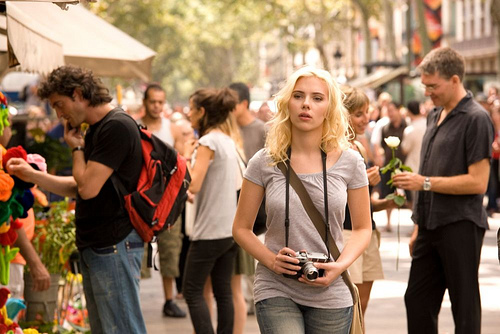
“Maria Elena used to say that only unfulfilled love can be romantic.”
Woody Allen steps out of his New York comfort zone to tell this story of soul searching and escape for two American girls on Holiday in Barcelona. Vicky is looking for an edifying experience and brief escape from an an engagement to a very practical man. She is established in a rather safe life.
Cristina, on the other hand, is an explorer, quite satisfied with the uncertainties of the future. She has come to “find herself” in the sunny surroundings. “If you asked her what it was she was gambling her emotions on to win, she would not have been able to say. She knew what she didn’t want, however, and that was exactly what Vicky valued above all else.”
In the midst of their journey, they meet a local painter, named Juan Antonio. He confidently approaches them at a restaurant and proposes a weekend getaway to Oviedo, a romantic location to which he will fly them in his own personal plane. Cristina is immediately taken aback by his brazen offer of a weekend of art and love making, while Vickey is rather put off by his candour. The pendulum swings in Cristina’s favour, despite Vicky’s protestations.
Thus they embark with this charming stranger, known not only for his art but for his tumultuous relationship to Maria Elena, also an artist, and the wildcard in his life, flying in the face of his seemingly grounded and calm presence.
As she unexpectedly returns to his world, finding him in his dalliance with Cristina, she is furious. Eventually, Cristina moves further into their temperamental relations and becomes the missing piece of their union. Vicky gets a little taste of this world and recoils back to her safer path while Cristina further learns what she does not want. “We were both sure that… our relation was perfect, but there was something missing.”
9. Les Amants Du Pont-Neuf (Carax | 1991)

“Lovers On The Bridge,” by Leo Carax, is a story of two lost souls waltzing in their own world while the rest of the world plays out in the background. They occasionally peek inside, but only as outsiders. Alex is homeless and Michèle is losing her sight. Together they escape into their playground landscape of old Paris. “My dreams sent me. People in dreams, ought to call them when you wake. Make life simpler. “‘Hello, dreamed of you. Love woke me.’”
Together, these two whisk each other through the dregs of Paris, occasionally poking their heads out of their place in forgotten alleys and from a bridge under repair. Lying on a sidewalk, they look through windows, watching people dancing in a thriving discotheque. Inspired, they take that energy out into their own dance, on the bridge, whilst fireworks explode off in the distance.
Homeless and alcoholic, Alex leads Michèle deeper into this withered underworld, showing her the poetry of the aged streets. Carax makes this film very intimate by fully bringing us into their world. We see everything as it appears to them, at street level. Michèle’s family searches for her, promising a treatment that could potentially save her vision.
Fearing losing her, Alex tries to keep her unaware of the search. The weary state of the bridge is a fitting ground for this damaged duo to dance their brittle dance before the song must end
10. Chungking Express (Kar-wai | 1994)
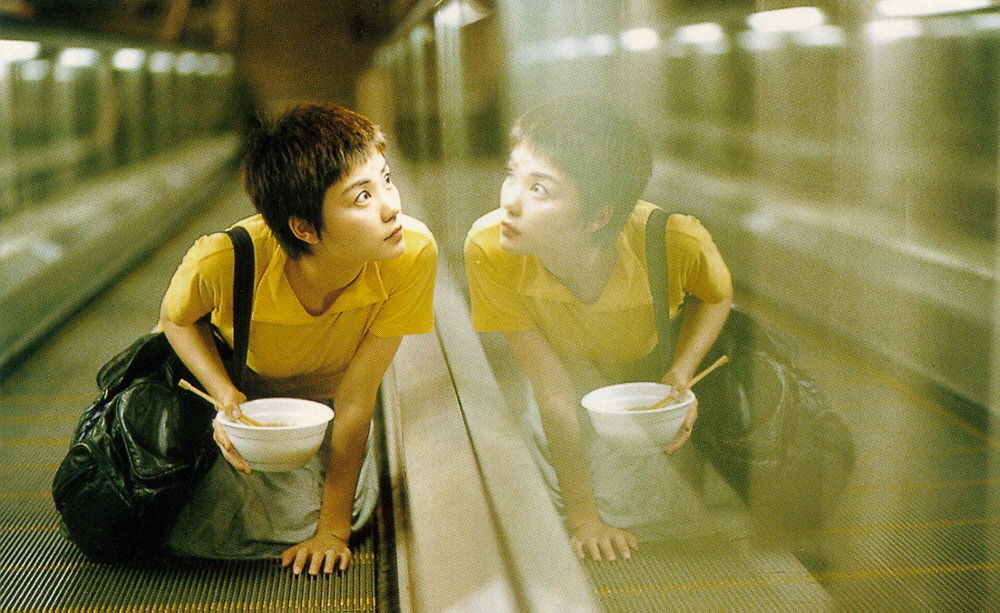
“If memories could be canned, would they also have expiry dates? If so, I hope they last for centuries.”
War Kar-wai made this film as a refuge, of sorts, during a hiatus from ASHES OF TIME, a film which was incredibly epic in scope. He yearned to create something with a freshness and spontaneity, lacking from the arduous process of undertaking such a large scale project.
The script was still underway after production had begun and an almost casual veritė style of cinematography was employed, by Christopher Doyle, in capturing two separate stories of longing and loneliness.
Sometimes the dream of that special place is every bit as important as the discovery. Faye has become intrigued by Cop 663 and, after acquiring a key to his apartment, spends several afternoons redecorating his space with her own energy. “California Dreaming” constantly colours her intentions. She has dreams of travel and he would be just as happy to stay in one place. Her restless energy is captured by Doyle’s handheld style, a very unusual trait among Kat-wai’s milieu.
The other story thread follows He Qieu’s abandonment by his girlfriend, May, and his subsequent obsession with buying canned pineapples that expire on May1st, due to her love for them. These two stories meet at the snack bar where Faye works. This is a fitting junction in the lives of characters who had been either lost or found, not quite connecting but leaving behind traces of themselves, whether they be pineapples or redecorated homes.
Ultimately, Cop 663 takes over the snack bar and Faye follows her desire to travel by becoming a flight attendant. We leave this world in a similar state of longing to the strains of The Cranberries, “Dreams.” “Oh my life is changing everyday / In every possible way / And oh my dreams /It’s never quite as it seems/ Never quite as it seems / ‘cause you’re a dream to me…”
11. San Junipero (Brooker | 2016)
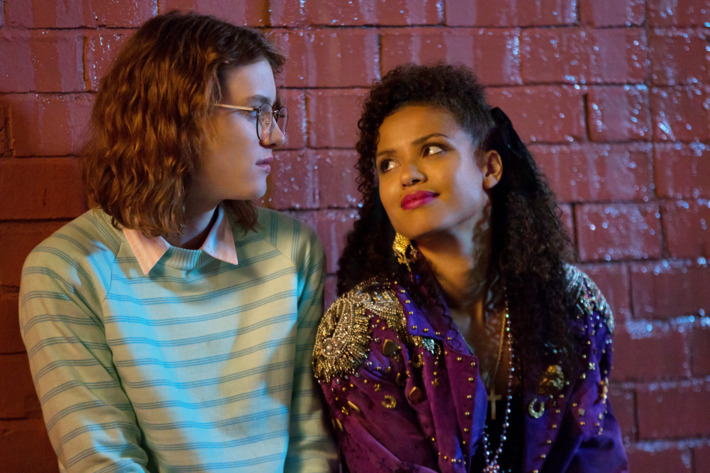
“Uploaded to the cloud, sounds like heaven…”
San Junipero is an episode of the third season of the British series, Black Mirror. San Junipero is a place where people are able to live out their fantasies. The story opens in an 1980’s era video game arcade. A young woman, named Yorkie, is playing a game called Bubble Bobble as a young man approaches her, informing her that the game is special because the ending is different depending on whether you play by yourself or with a partner. “It was the first game to do that.”
Yorkie is wandering, observing, searching for something in this strange land. At first it is unclear if this is a period piece, or something else. She is innocent and, seemingly new to this world. A woman sits down beside her, a woman full of life, the heart of a party. She is the perfect counterpoint to Yorkie’s conservative appearance and demeanour. “Pretend you know me,” she says as a man approaches. Yorkie is taken aback by her audacity and carefree spirit. This is Kelly.
Over the course of an indiscernible stretch of time, these two come to form an intense bond to each other. Yorkie is often frustrated by Kelly’s carefree ways but Kelly is adamant that “Before I leave, I’ll have a good time. I’m just gonna have a good time.” Yorkie, however, is looking for something more secure and lasting. They have each come to this dream place for something “else” and, in so doing they found each other.
Each chapter of this episode is separated by a fade to black where he hear unintelligible hospital-like sounds. We do not yet know why they are here, but both are escaping from something and they are both on a clock.
Charlie Brooker has crafted a tender love story about second chances, true love and transcendence of the limits of the human body. Maybe San Junipero is a place for immortality, or maybe as a reminder that love really does transcend corporeal form. As Belinda Carlisle sings, while we speed towards an infinite setting sun, “They say in heaven, love comes first / We’ll make heaven a place on earth / Ooh, heaven is a place on earth.”
12. Hiroshima Mon Amour (Resnais | 1959)
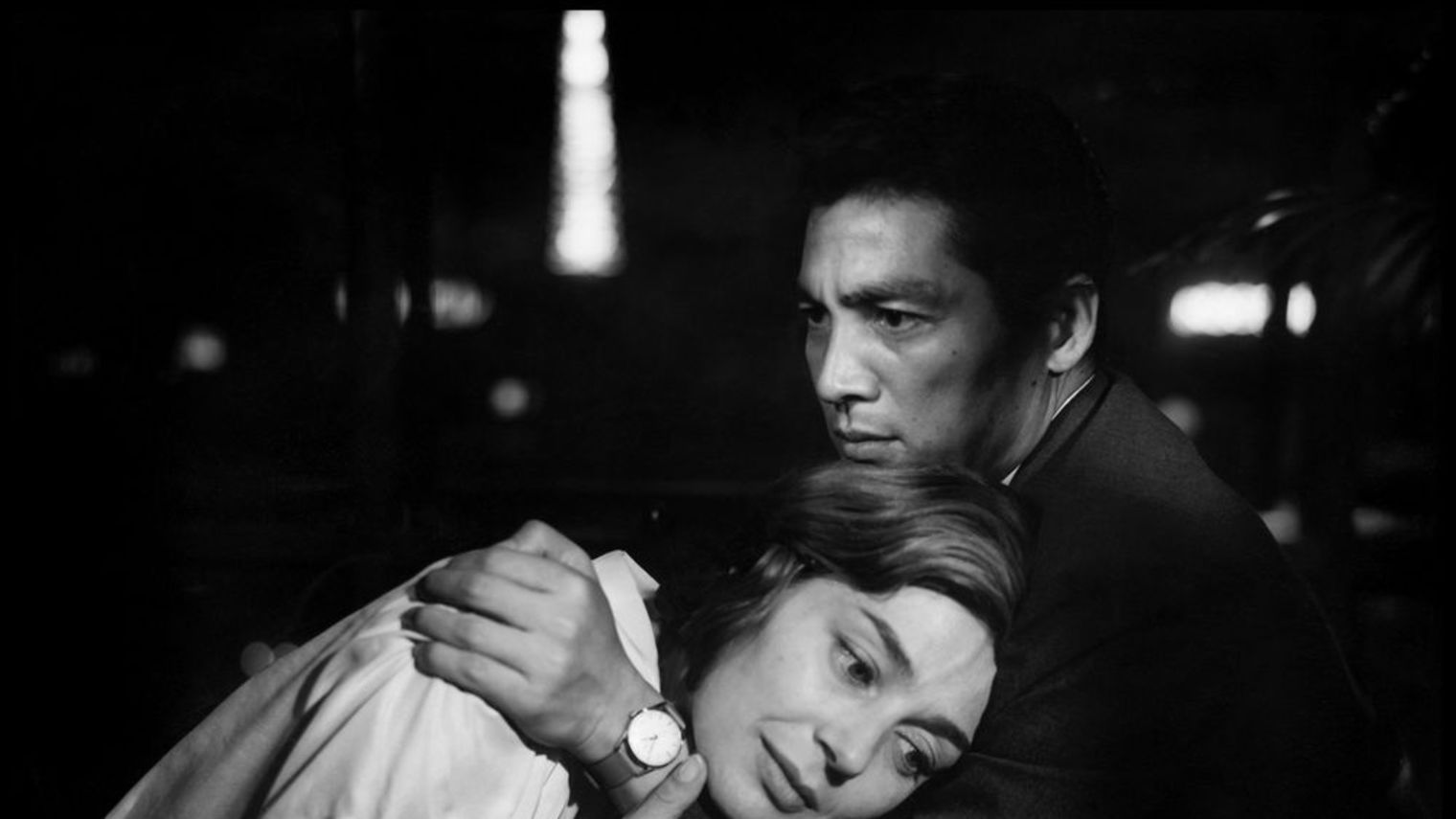
“All these years I’ve been looking for an impossible love.”
Hands. Arms. Lover’s limbs in tangled embrace. Memories merge together. Memories of horror, trauma and human remains wash together in waves. The remains of love and the words of lovers serenade us, encapsulating the tapestry of beauty and horror that only the human race can weave as it does.
Wordless embrace. Longing and mourning. Echoes of lives lived. After a brief relationship, a French actress and a Japanese architect prepare to depart each other, and memories of loss mingle together and are contrasted with the bombing of Hiroshima.
Alain Resnais, directing from a script by Marguerite Duras, melds together a 36-hour conversation between parting lovers into a 90 minute journey, spoken in voiceover narration, through memory and time, where all bleed together in a formless wave. Stillness and motion. In the annals of cinema, this film remains a peerless, impressionist exploration of the human condition. The horrors we have committed, contrasted with the love we have made.
“I’m beginning to forget you. Forgetting so much love is terrifying.”
13. Code 46 (Winterbottom | 2003)
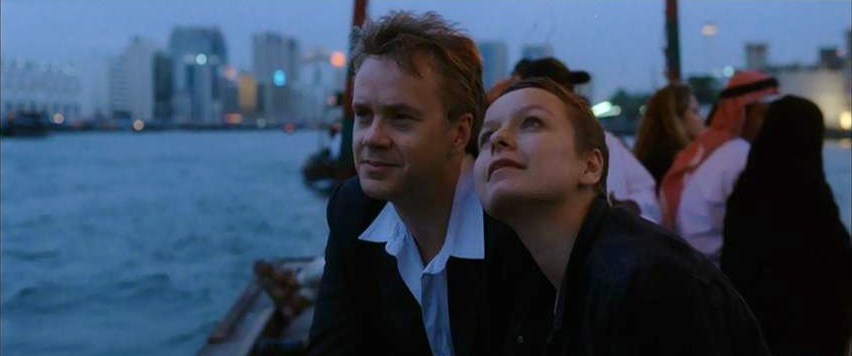
“If you knew how this would end, would you have taken that first step?”
Michael Winterbottom, working from a script written by Frank Cottrell Boyce, realizes this story of a brief encounter between two lovers from different worlds, brought together by circumstance.
In the not too distant future, William is a family man who works as a government investigator. When he is sent to Shanghai, to solve a case of fake IDs, he meets a woman named Maria. He comes to realize that she is behind the forgeries but is uncontrollably drawn to her. With only a 24 hour visa granting him access, he entangles into a passionate affair with her. In this dystopia future, genetically incompatible pairings are considered “code 46” violations.
Winterbottom lyrically explores their dangerous entanglement, layering voiceover and memory montage, as they escape into each other against the tick of the clock. It is a sensual way to explore a world where multiple cultural languages merge into a fragmented song, the echoes of people coming and going, leaving traces of their experiences in their wake.
The ultimate cost for Maria is that she is left the sole artifact of this experience, after William’s memory of the one night encounter is erased. She is left staring out into the horizon as the tides of time erode away their respective beaches.
“Can you miss someone you don’t remember? Can one moment or experience ever disappear completely, or does it always exist somewhere, waiting to be discovered?”
14. The Double Life of Veronique (Kieslowski | 1991)

“I have a strange feeling. I feel like I’m not alone in this world…”
In Poland in 1968, a little girl is shown the stars in the winter sky by her mother. “That’s the star we’re waiting for to start Christmas eve. You see it? And there…look at all the haze there below. It’s not haze. It’s really million of little stars. Show me. “In France, a little girl is shown one of the first leaves of spring ring by her mother. “Here’s the first leaf. It’s springtime, and soon all the trees will have leaves. Look. Here, on the lighter side, there are little veins and a very fine down.”
Polish filmmaker, Krzysztof Kieslowski (1941-1996) was fascinated by duality, by parallels. Stories of chance and fateful encounters. In this story two girls, born at the same time, worlds apart, are inextricably linked to one another. Where does déjà vu come from? Have we experienced things before? One woman is Polish. One is French. Both are singers.
When Polish Weronika, with her weak heart, dies during an intense performance, Veronique, in France, suddenly decides, for an unknown reason, that she should discontinue singing. “All my life I’ve felt I was in two places at the same time. Here and somewhere else.”
Kieslowski was a master of evocative, impressionistic and lyrical storytelling. He was able to express feelings with no need for exposition. Feelings must be felt. Lives must be lived. He knew there was a current, of some kind, which ran through, and under, everything. These two woman crossed paths without ever meeting. When a storyteller and puppeteer has occasion of witnessing them both, he tells a story of two girls; one one dies and another who lives on. A butterfly emerges from her cocoon.
The entire film is shot through a hauntingly beautiful warm golden filter, mirrored by many shots distorted and filtered through glass objects, showing us two worlds, at once the same and different, existing together. Across the divide, somehow, these two women are able to reach through and touch. Artifacts from an unknown past.
15. Lost In Translation (Coppola | 2003)
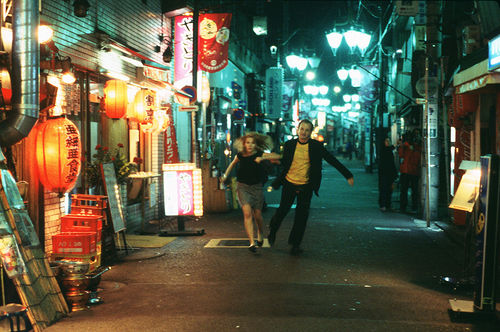
“Let’s never come here again because it would never be as much fun.”
Sofia Coppola’s sophomore film takes us to Tokyo, Japan, for a brief encounter between two lost souls, adrift, far from home. A master class in present-tense storytelling, Lost In Translation beautifully captures the spirit, excitement and energy of exploring a new place while making a new connection that would otherwise have been unlikely.
The racing heart of true connection. Love’s first blush. Bob is a world weary actor, taking a vacation from a stale marriage, in town to shoot an ad for Suntory whisky, when he crosses paths with Charlotte, a college graduate, recently married and still trying to decide what to do with her life.
Were the conditions any different, the likelihood of this connection would have been slim. This place, and their mutual unfamiliarity, opens a channel for them to speak in their native tongues.
After a series of casual encounters, Charlotte invites Bob out for a night on the town. Without hesitation, he accepts. In this strange land they find, in each other, a common ground and, after a series of parties, that ultimately leads them to the karaoke room where that first blush begins to bloom.
Two strangers, in a strange land, share their loneliness, all the while knowing, feeling, that this could never last but, as Bob croons to the strains of Roxy Music, “More than this, you know there is nothing…”
After a brief rest in the hallway, we are back in the shimmering sea of lights of Tokyo, at night. The hazy wash of “Sometimes,” by My Bloody Valentine, sails us through this sea as Charlotte, hair blowing in the open air, gazes out the window, while Bob sleeps. “Close my eyes, Feel me now, I don’t know, maybe you could not hurt me now
Here alone, when I feel down too, Over there, when I await true love for you
You can hide, oh now, the way I do, You can see, oh now, oh the way I do.”
Somehow, in the vast neon world around them, they have picked up on each other’s frequencies and found a connection, amidst the foreign sounds and colours. As Bob carries Charlotte back to her hotel room, to tuck her in, before parting alone, the two of them, disillusioned with marital uncertainty, have made a life raft to share, while it lasts…
Author Bio: Jason R. Gray is an award-winning filmmaker from London, Ontario, Canada. He graduated from Western University, with an Honours Bachelor of Arts in Film Studies and English. He writes, directs, photographs, edits and has also begun to score his own films. He is known for She Has Divided Me (2011) The Golden Hour (2014) and has recently completed his first feature, Glass (2017), which has been receiving wide acclaim on the festival circuit.